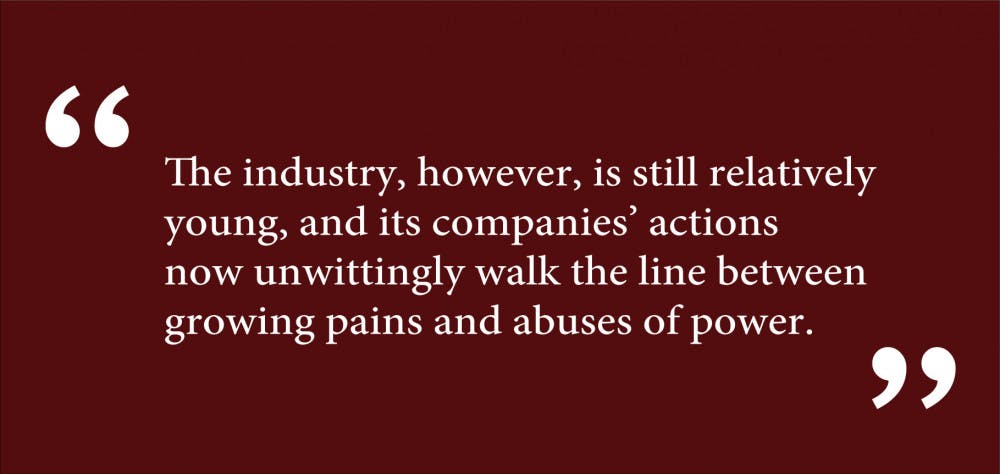Like many other Brown students on the hunt for a summer internship, I am captivated by the tech industry. There are many obvious reasons driving students to seek jobs and internships at companies such as Google, Amazon, Uber and Tesla: These companies are innovative and seem to pamper their employees at every turn, from benefits (Google offers its employees free massages and nap pods) to creative office designs (Airbnb models its headquarters’ conference rooms after apartments rented on the site). But perhaps most importantly, tech companies are extremely powerful in the modern global economy, making the work done there all the more impactful. Google continues to map the world, Amazon has brought a significant portion of consumer retail online, Uber has introduced the age of self-driving cars to Pittsburgh and Tesla has revolutionized the electric car, to name just a few innovations.
The industry, however, is still relatively young, and its companies’ actions now walk the line between growing pains and abuses of power. As Mark Liang ’19 noted in his recent column (“Too much tech,” Nov. 14), these companies are now deploying their clout in real estate markets: Amazon has cities “pimping themselves out” as potential sites for their new headquarters while Snap Inc. “single-handedly” gentrified Venice Beach, to the dismay of its lower-income residents. Though tech companies receive more attention for their roles in producing these urban problems, more insidious are the issues of gender-based pay imbalances and sexual harassment plaguing the entire industry. These two problems are inextricably linked, as gender imbalances in pay and power put men in a position to harass, while cases of sexual harassment are usually symptoms of wider gender-based issues. The tech industry has well-documented problems on both fronts, and unfortunately it seems as though the known cases are only the tip of the iceberg.
For example, Google — whose public relations history had long remained unmarred — is perhaps the most notable tech company to be called out for gender-based wage disparities. According to a New York Times report published this year, Google pays its female employees less than male employees “at most job levels.” These kinds of relatively widespread problems can be symptomatic of even deeper cultural issues. For Google, this certainly seems to be the case: This summer, the company fired a software engineer, James Damore, who sent out a company-wide memo claiming that women are paid less because they experience “higher levels of neuroticism” than men, among other reasons.
In particularly egregious cases, these kinds of sexist attitudes can balloon into pervasive cultures of sexual harassment. Within the tech industry, Uber is the poster child of this phenomenon. The company was rocked by a mass firing of twenty employees this past summer, including the company’s former CEO, Travis Kalanick, following investigations into 215 sexual harassment claims. Now Uber, in addition to facing lawsuits against taxi driver unions around the world, faces a lawsuit for racial and gender discrimination from three female plaintiffs.
The issue of sexual harassment is particularly relevant now in light of allegations against Harvey Weinstein, former President George H.W. Bush, Kevin Spacey and Sen. Al Franken, D-Minn., among other entertainers and politicians. But the issue deserves special attention in the tech industry because of its influence over the country’s ideas and values. Tech companies control the channels of communication through which ideas are created and shared, and have an inordinate impact on the information to which people are exposed. Just look at President Trump’s prolific use of Twitter, or Facebook and Google’s role in the 2016 election. If we allow gender discrimination to go unchecked in the country’s most influential companies, the culture can spread to other industries and it will only result in the tech industry becoming more male-dominated by construction. We are already seeing some of this in action: Although there are no exact numbers, according to the New Yorker, almost half of the women who enter tech eventually leave — more than double the rate among men — and among women who do leave, 60 percent claim that harassment contributed to their decision.
As Brown students, it is worth our time to investigate the histories of companies where many of us aspire to work. But, given that 16 percent of the Class of 2016 went into the tech industry, I wouldn’t advise students to simply write off companies that have questionable records, since the vast majority do. Instead, the Brown student body has a tangible responsibility to engage with these companies and improve their cultures and equitability should we ever work for them. There are Brown alums in the process of doing this, such as current Uber CEO Dara Khosrowshahi ’91, who signed the White House’s Equal Pay Pledge in 2016 as CEO of Expedia and plans to promote a similar ethos at Uber. While gender-related problems are dissected on a daily basis at Brown, the tech industry continues to struggle to even acknowledge the existence of these concerns. Brown students can and should help to address these important issues in the professional world.
Andrew Friedman ’19 can be reached at andrew_friedman@brown.edu. Please send responses to this opinion to letters@browndailyherald.com and other op-eds to opinions@browndailyherald.com.





